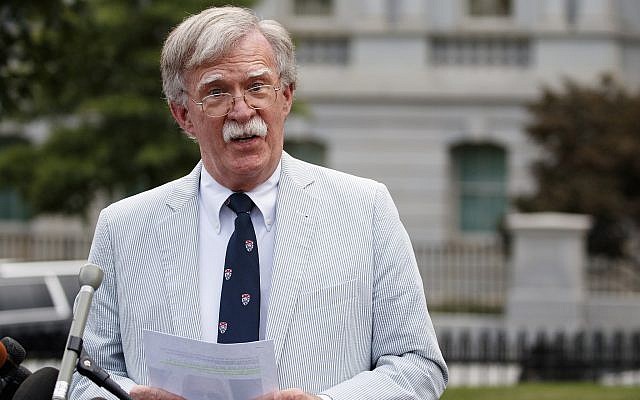Bolton: Trump’s readiness to talk with Iran doesn’t signal shift in stance

US President Donald Trump’s willingness to hold direct talks with Iran doesn’t signal any change in his administration’s stance toward the Islamic Republic, his national security adviser, John Bolton, said Tuesday.
“Talking with them [Iran] does not imply for President Trump changing your position and the idea that Iran would receive some tangible economic benefit merely for stopping doing things it shouldn’t have been in the first place is just a nonstarter,” Bolton told Radio Free Europe/Radio Liberty in an interview as he visited Ukraine.
“If there is a comprehensive deal then of course the sanctions will come off at point. When the regime in Iran is ready to talk about that then there’ll be a meeting,” he said.
Foreign Minister Mohammad Javad Zarif’s comments came two days after he was invited by French President Emmanuel Macron to make an unscheduled trip to Biarritz for talks on the sidelines of the G7 summit, in what was seen as helping herald the diplomatic opening.
“I said during the visit to [G7 meeting in Biarritz, France] that no meeting between the Iranian president and Trump could be imagined. We will not have any bilateral talks until the US joins the G5+1 and implements the nuclear deal; even then there won’t be any bilateral talks (with the Americans),” Zarif was quoted as saying by Iran’s Fars news agency.
“No meeting will be held with the American officials,” he continued. “We have made it fully clear that the US administration and Trump have violated the agreements which had come after long-time talks between the two countries, and implementation of the past agreements is necessary now and we have not yet seen any considerable sign in this regard on the side of the US administration.”
Trump had said on Monday that he was ready to meet with the Iranian president within weeks, but Rouhani on Tuesday dampened hopes by saying that the US would need to scale back punishing sanctions before he would be game for a summit.
“Without the US’s withdrawal from sanctions, we will not witness any positive development,” Rouhani said in a televised speech, adding that Washington “holds the key” as to what happens next.
Rouhani had initially appeared to support talks with the Americans, defending Zarif’s trip to France after he came under fire from hardliners.
“If I knew that going to a meeting and visiting a person would help my country’s development and resolve the problems of the people, I would not miss it,” he said Monday. “Even if the odds of success are not 90% but are 20% or 10%, we must move ahead with it. We should not miss opportunities.”
In his speech the following day, the Iranian president said his government’s policy of “constructive interaction” with the world was in line with the supreme leader’s approach of “extensive interaction.”
But he stressed the United States had to “retreat from their mistakes” and return to commitments made under the nuclear deal.
Trump has put in place a policy of “maximum pressure” on Iran through crippling sanctions that critics see as raising the risk of conflict in the Middle East between the US and Iran.
Since the US pullout from the nuclear deal in 2018, Iran has lost billions of dollars in business deals allowed by the accord as the US reimposed and escalated sanctions largely blocking Tehran from selling crude abroad, a crucial source of hard currency for the Islamic Republic.
Rouhani’s U-turn can be seen as a result of pressure from hardliners in the Iranian establishment who oppose taking a softer tone toward the West.
The hardline Javan daily, which is close to Iran’s powerful Revolutionary Guard, warned Rouhani in large font on its Tuesday front page: “Mr. Rouhani, photo diplomacy will not develop the country.”
Israel is deeply worried by Trump’s declared readiness in principle to meet in the near future with Rouhani, top ministers were quoted saying on Monday evening. The fear is that the US president will open a dialogue with Iran similar to the ongoing one he has with North Korea, taking pressure off Tehran.
To say that Prime Minister Benjamin Netanyahu is uncomfortable with the US president’s newly open-minded stance on Iran “is the understatement of the millennium,” Israel’s Channel 13 reported, quoting what it said were three senior cabinet ministers expressing profound concern that just as Trump has “gotten nowhere” with North Korea, while relieving the economic pressure on Pyongyang, the same would now happen with Iran.
“We have no interest in a negotiations between the United States and Iran,” the TV report quoted one minister saying, “but our capacity to influence and confront Trump is extremely limited.” This, the report went on, was because Trump has “bear-hugged” Netanyahu so tightly that going out against him is deemed impossible.
Netanyahu has been a strident opponent of the 2015 deal with Iran on its rogue nuclear program, arguing that Tehran is intent on attaining a nuclear weapons arsenal, has lied to the world about its plans, and that the 2015 accord actually paves the way to an Iranian bomb. Trump has hitherto adopted a similar stance, and pulled the US out of the accord last year.
Read more: The Times of Israel
